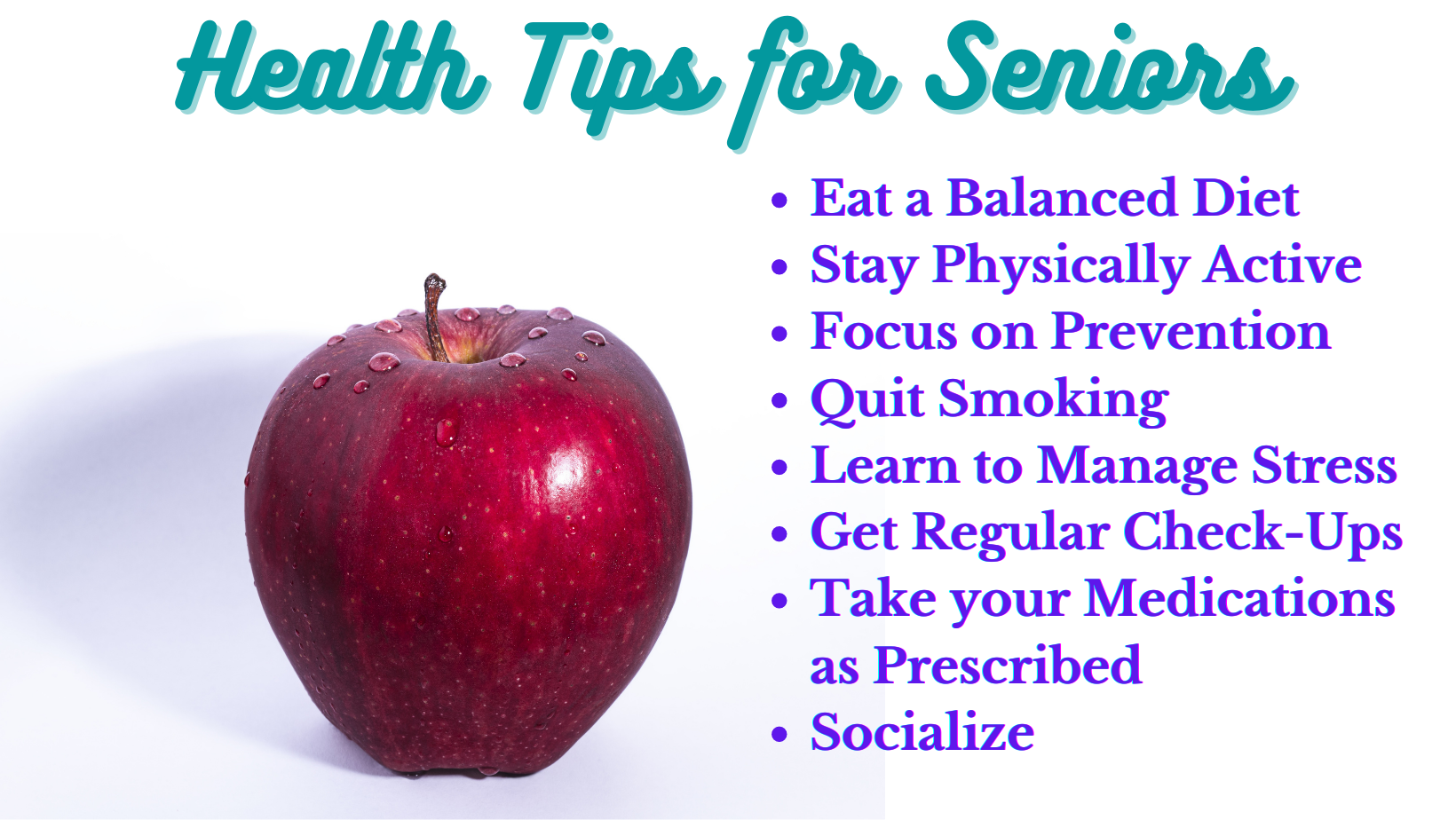
Keeping up with healthy behaviors is important to maintain quality of life and reduce the risk of chronic conditions like heart disease, type 2 diabetes, arthritis, and cancer.
Eat a well-balanced diet of whole foods and limit salt, sugar and added fats. Drink plenty of fluids, especially water. Staying active and socially engaged are other key factors to a happy and healthy lifestyle.
Eat a Balanced Diet
Healthy eating is important for everyone but it’s especially vital as you age. Your body’s metabolism slows down and you require less energy, so portion sizes should be adjusted to maintain a healthy weight. You may also need more of certain nutrients, like calcium and vitamin D.
Choose whole foods, especially those from the outer edges of the grocery store and avoid processed food items (e.g., commercial burgers, cookies and cakes, fried foods and salty snacks). Drink water or low-fat milk to stay hydrated.
Eat a variety of fruits and vegetables, whole grains, low-fat or fat-free dairy, beans and lentils, and fish. If chewing and swallowing are a challenge, try soft cooked or canned foods. Try supplemental nutrition drinks that are fortified with vitamins and minerals.
Get Enough Sleep
A good night’s sleep is vital for all ages, but seniors need quality sleep just as much as everyone else. Insufficient sleep can lead to depression, attention and memory problems, daytime sleepiness, and a higher risk of falls and other health conditions.
Getting enough sleep helps maintain physical and mental health and boosts the immune system to fight infection and heal faster. If your senior loved one is waking up frequently or struggling to get a restful night’s sleep, talk to their doctor about possible causes of the problem and how it can be addressed.
To help your loved one fall asleep, try keeping a regular sleep schedule, removing electronic devices from the bedroom, exercising in the morning or evening, avoiding large meals and caffeine or alcohol before bedtime, and making sure their room is dark, quiet, and comfortable.
Stay Active
As we age, exercise is more important than ever. It reduces the risk of chronic health conditions, strengthens bones and muscles, improves balance and flexibility, and enhances mood.
Regular physical activity also slows cognitive decline and can even reverse mild dementia symptoms. It’s a good idea for seniors to aim for about two and a half hours of moderate-intensity activity each week.
Encourage your senior to try activities such as dance, walking, tai chi and chair yoga. These workouts build strength without overdoing it. They can also help increase core muscle strength, which makes it easier to balance and reduces falls. A pedometer can help your senior monitor daily steps, which should be at least 1,500 per day. Walking up and down stairs is another great option for improving strength.
Stay Warm
Elderly adults can be particularly vulnerable to the cold, especially those who are infirmed or experiencing homelessness. It’s vital to help them stay warm by providing adequate clothing and a safe, reliable heat source.
Encourage them to eat healthy foods that will help increase body temperature, such as soups and stews, roasted vegetables, nuts, and whole grains. In addition, it’s important to make sure they drink enough water to avoid dehydration.
Keeping seniors warm also includes dressing them in layers and ensuring they have a hat, scarf, gloves, and winter boots. They should also change out of damp or wet clothing right away, as moisture can rapidly lower body temperature.
Stay Connected
While social distancing is no longer in place in many areas of the country, it may be challenging for seniors to connect with others in-person. They need to be open to trying new ways of connecting and engaging with others in their community.
This includes casual conversations with people that they may run into in the neighborhood or on public transportation, like a friendly “hello” and a smile. Also, they can stay connected with family members who are non-local by making a regular call on the phone or video conferencing service, such as Zoom or FaceTime.
Being socially active has a positive impact on our mental health, and it reduces the risk of cognitive decline. It can even lower blood pressure and help us adopt healthier lifestyle habits.